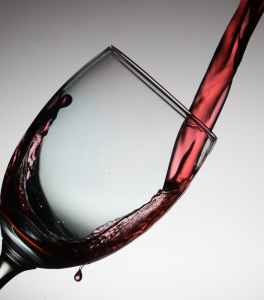
In view of the many passages in the Bible and in ancient literature that speak of nonalcoholic drinks as wine, perhaps we should not be so quick to assume each time we see “wine” in the Bible that it refers to a strong alcoholic drink. People in Bible times were not drenched in drugs. (David Brumbelow)
A month or so ago I read very quickly the book Ancient Wine in the Bible by David Brumbelow. I did not read all the appendices or the last chapter consisting of quotations, but I did read the main body of the work. Overall, this book was a helpful introduction to various issues within the abstinence debate. The reason it was helpful was because of his attempt to give extensive references to ancient literature, as well as commentators positions on various Bible issues. Most important of all, he shows persuasively why the surrounding context must be used to determine if wine in a given passage is alcoholic or not. It is the extensive quotations that show that in the past it was not so uncommon to refer to nonalcoholic grape juice as wine. These observations fit with the grammatical-historical method of interpretation I hold to. These observations are allowing historical context and the surrounding context of a passage to inform the meaning of the text when the word wine is used, rather than reading the modern meaning of wine into the text of Scripture. Admittedly, I now see more clearly how I was blinded by the way we use the word wine as I tried to read Bible.
By way of specific comments, I can make a few observations. The author does repeat himself quite a bit and there was definitely evidence of some sloppiness to some degree. I am willing though to overlook the sloppiness, because I came away with clarity about how he approaches the issue. As for his position itself, the most significant contribution he makes is that we cannot and should not assume that every time the word wine is used in the Bible that we should assume it is the highly alcoholic beverages that are called by said name today. In fact, there is sufficient evidence (though I don’t agree in every case with his interpretations) that in the Bible we can detect some cases where non-alcoholic wine is in view (such as places where the Lord speaks of wine as being a blessing) and others where alcoholic is in view (e.g. Prov. 23:29-35). This contextual interpretive approach is exactly what I hold as the proper interpretive method in general. This opens the door for me to think carefully about each passage and try to reach better conclusions about this topic. However, there is no question that the cause of abstinence is strengthened. The fact is, I had unconsciously assumed that every time I read wine in the Bible that alcoholic beverage was in view. This book has taught me about ancient wine, and that helps me better understand the setting of the Bible times.
I will comment further though that there are times that he seems to be very repetitive and have the same answers to every passage. A lot of time, the arguments are not primarily exegetical. The best examples of this kind of point are in the lists that he sometimes give of reasons that alcoholic wine is not in view (e.g. pp 140-142). In light of the lack of exegetical arguments (at times), I am furthermore challenged by the fact that one of the words he argues in John 2 can mean “filled” and not “intoxicated” is not listed as such in BDAG (the standard Greek lexicon). BDAG only lists the “makes intoxicated” definition. This does not entirely disprove his arguments overall, but I do think there may be better work to be done on the exegetical side.
In conclusion on this matter, I have been an abstainer all my life. This was given from the teaching of my mother, and is backed by many family testimonies about the destructive nature of alcohol. However, I have found myself challenged in this area as it pertains to Biblical teaching. This book has given me very helpful orientation to the historical background concerning this topic, and has equipped me for future study, and to be better able to defend the abstinence position Biblically. One should just be prepared that the large number of quotations make it a bit choppy to read, and that the frequent repeated points may also become tiresome. Overall, I recommend this book for everyone on both sides of the debate.
Hello Jacob. Thank you for the article. It’s thought provoking. Dr. Daniel B. Wallace wrote an article on “The Bible and Alcohol” several years back and I thought it was helpful. This might add to the discussion. https://bible.org/article/bible-and-alcohol
Thank you Dr. Cook for your comment. I will read that for sure, to see what Dr. Wallace says.
Thank you son, encouraging, as I struggle with my firm stand against which is Not shared by So many. I would love to borrow this book if you have a hard copy that you’d be willing to lend thanks have a Great Day
Good Mom. I actually borrowed a copy of the book through Inter-Library Loan here, but you can get it on Amazon at https://www.amazon.com/Ancient-Wine-Bible-Case-Abstinence/dp/0982656122.